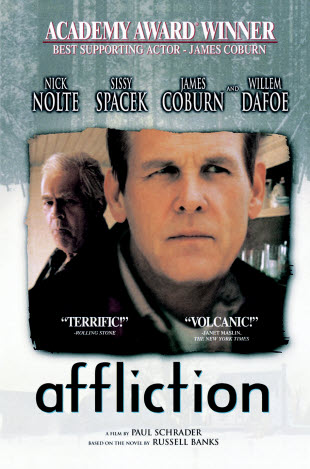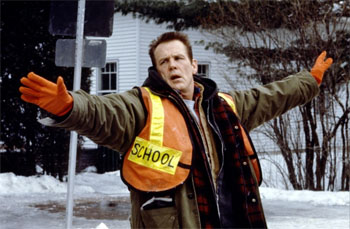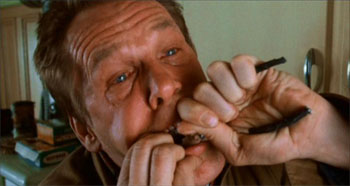 Affliction (Dir. Paul Schrader, 1997):
Affliction (Dir. Paul Schrader, 1997):
“To the audience of a tragedy, the catastrophe will seem, finally, to be inevitable.” So says the Brooklyn College English department, and you better believe Paul Schrader agrees; his cinematic career is littered with the husks of tragic palookas, from the one-two punch of Robert DeNiro’s Travis Bickle and Jake LaMotta all the way to Hogan Heroes‘ Bob Crane in Auto-Focus (2002). Unlike, say, Shakespeare, Schrader isn’t so much about building suspense around whether his sad-sacks will fail — it’s more about taking a long, unflinching look at the fall. Affliction is no exception to this rule; based on the Russell Banks novel of the same name, it shares the wintry, hopeless landscape of Banks’ The Sweet Hereafter (filmed by Atom Egoyan in 1994), as well as its pretensions regarding the human condition, wrapped in the pitiful dramas of local rural types. And just in case we don’t get it, we get the theme of the whole shebang spelled out for us by Rolfe Whitehouse (Willem Dafoe), the narrator of our story, as he muses on his alcoholic, abusive father Glen (James Coburn): “At least I was never afflicted by that man’s violence.”
“That’s what you think,” snorts Glen’s brother Wade (Nick Nolte), and therein lies our tale. Wade’s very name is a jeer, a joke, for he’s not just wading into troubled waters, he’s positively wallowing in them. While Rolfe has retreated to a moderately successful professorship in Boston, Wade is still stuck in the New Hampshire town in which he was raised, reduced to being a sheriff-lackey for town fat-cat LaRiviere (Holmes Osborne), estranged from his ex-wife (Mary Beth Hurt), flailing in his efforts to connect with his daughter Jill (Brigid Tierney). We see within the first fifteen minutes that he’s not destined for much of anything besides grumbling about his lot and stealing a few puffs of pot with his buddy Jack (Jim True-Frost). Pinning him down exactly, Jill murmurs, “I just think you used to be bad,” a charge Wade denies, but in Nolte’s hooded gaze we can tell that this is a man who can only keep a lid on himself with a herculean effort.
 Sure enough, Affliction is intent on blowing that lid from the get-go. When Jack escorts a big-time businessman into the forest on the first day of hunting season and a mysterious accident leaves said businessman dead, Wade is roused from his stupor enough to raise questions about the event, and by thinnest of associations, his own life. The mystery behind the murder might be the plot kick-starter, but it ultimately takes a back seat to Wade’s free-falling family life, which comes apart at the seams when his mother dies, leaving him with custody of his ornery dad, whose very presence is a reminder of childhood trauma, and whose every word is bile.
Sure enough, Affliction is intent on blowing that lid from the get-go. When Jack escorts a big-time businessman into the forest on the first day of hunting season and a mysterious accident leaves said businessman dead, Wade is roused from his stupor enough to raise questions about the event, and by thinnest of associations, his own life. The mystery behind the murder might be the plot kick-starter, but it ultimately takes a back seat to Wade’s free-falling family life, which comes apart at the seams when his mother dies, leaving him with custody of his ornery dad, whose very presence is a reminder of childhood trauma, and whose every word is bile.
Suffice to say that from this point forward everything that can go wrong for Wade will go wrong, his best efforts to make something of himself and start a new life with the comely widow Margie Fogg (Sissy Spacek, understated and heartbreaking) backfiring at every turn. The investigation of the businessman’s death leads into shady corners which may or may not be the embellishments of Wade’s tortured imagination, and then there’s the aching tooth in his gums that causes him no end of aggravation. “You know I get the feeling like a whipped dog some days,” he growls. “Some night I’m gonna bite back, I swear!”
Is there any doubt that like Travis Bickle, this dog will bite? The only question that remains is who will get bitten, and the plot’s resolution is neatly deployed, but Schrader overplays his hand by following Banks’ framing device, with the story told by Rolfe. Like an intellectual, Rolfe (along with Banks and Schrader) bludgeons us with the obvious-turned-universal: “Our stories, Wade’s and mine, describe the lives of the boys and men for thousands of years,” he muses in deadpan voice-over. “Boys who were beaten by their fathers, whose capacity for love and trust was crippled almost at birth, men whose best hope for connection with other human beings lay in detachment, as if life were over.” Yes, this is not the tawdry tale of a local guy who went over the edge, but the latest parable in how male self-destructiveness and rage, in all their boundlessness, are passed down from one generation to the next.
 So Affliction is a pummeling affair, much like when Wade finally takes a bat to someone at the story’s climax, but credit where credit is due: Schrader knows how to orchestrate this stuff for maximum impact, and every humiliation Wade endures makes us flinch, as if we’re the ones receiving a shot to the solar plexus of our pride. Nolte might be playing the proverbial bad man with the good man struggling to break out, yet in his capable hands we can buy the specificity of his character — a lump of unformed clay, he’s youthful and live-wire with hope one moment, sunken and embittered the next. He’s matched stride for stride by Coburn, who could have turned his patriarch into a parody right out of “Daddy Dearest,” but instead gets his points across with a slurred-out curse, a knowing leer, and finally that famous wolfish grin as he revels in his son’s failures: “You done it finely! Done it like a man!” he jeers, and in that moment, the old man is as alive as ever, as is the son, both of them damned, with Schrader’s vision hitting the heights it seeks.
So Affliction is a pummeling affair, much like when Wade finally takes a bat to someone at the story’s climax, but credit where credit is due: Schrader knows how to orchestrate this stuff for maximum impact, and every humiliation Wade endures makes us flinch, as if we’re the ones receiving a shot to the solar plexus of our pride. Nolte might be playing the proverbial bad man with the good man struggling to break out, yet in his capable hands we can buy the specificity of his character — a lump of unformed clay, he’s youthful and live-wire with hope one moment, sunken and embittered the next. He’s matched stride for stride by Coburn, who could have turned his patriarch into a parody right out of “Daddy Dearest,” but instead gets his points across with a slurred-out curse, a knowing leer, and finally that famous wolfish grin as he revels in his son’s failures: “You done it finely! Done it like a man!” he jeers, and in that moment, the old man is as alive as ever, as is the son, both of them damned, with Schrader’s vision hitting the heights it seeks.

